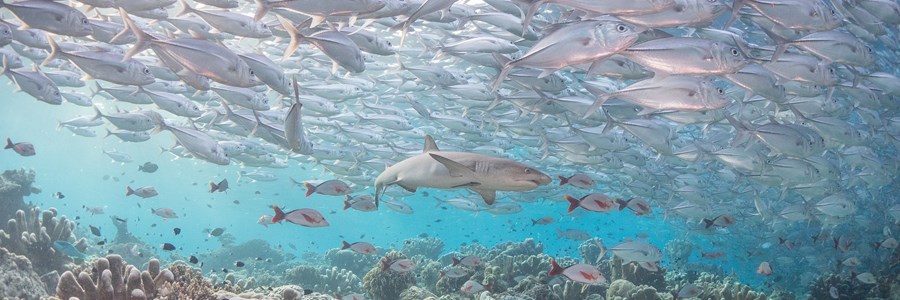UN report on biodiversity overlooks fisheries management achievements

A new report[1] from the UN expert group on Biodiversity and Ecosystem Services (IPBES) has found that nature is declining globally at rates unprecedented in human history with many species facing extinction at accelerating rates. According to the report, the oceans are no exception to this trend caused by changes in sea use, direct exploitation of organisms, climate change, pollution and invasive alien species. The European fishing industry, while acknowledging the potential risks for the marine environment, stresses that fishing poses no threat for the long-term preservation of marine resources. Proof of that is that thanks to fisheries management and industry-led efforts, fish stocks have been generally increasing in many areas such as the North East Atlantic, currently reaching levels 36% higher than in 2003. This positive trend shows that UN’s extinction warning particularly for fish populations is a bit far-fetched.
UN expert authors highlight that about 66% of the marine environment has been significantly altered by human actions and claimed that 55% of the ocean is covered by industrial fishing. The report also states that, in 2015, 33% of the marine fish stocks were being harvested at unsustainable levels.
According to Europêche, the report strongly overestimates fisheries impact on global biodiversity in the oceans. The sector recalls that fish know no borders. Fishermen need to ‘chase’ highly mobile marine species across the oceans to provide healthy food to consumers. However, this does not mean that EU operators fish everywhere. Thanks to recent high-resolution data of fishing activities, the footprint of fishing worldwide is revealed to be less than 4%[2], and not 55%. All while the fishing industry provides high-quality animal protein with the lowest impact on the environment, since wild-caught seafood does not require being artificially fed, the use of water supply, antibiotics or pesticides.
The sector acknowledges that further efforts are needed towards achieving the global goal to have all commercial fish stocks exploited at sustainable levels. However, it is to be noted that the majority of the global fisheries (67%) are currently sustainable. Europêche also argues that it is not only important to check the progress on the number of stocks fished at sustainable levels but also the number of tonnes of seafood coming from sustainable ´larger´ fish populations. In this sense, recent estimates[3] show that about 82% of the fish consumed worldwide is sustainable, 86% in the case of tuna. As for Europe, almost 100% of the landings from Atlantic stocks managed by the EU come from catches responsibly fished in line with the Maximum Sustainable Yield (MSY) policy.
The report further states that, in 2011, 33% of the world’s reported fish catch came from illegal, unreported or unregulated (IUU) fisheries. Europêche considers this percentage simply false and misleading since the UN expert agency on fisheries (FAO) referred the same year to a - still unsatisfactory - 15% of the world’s catch. In the case of the EU, figures from 2008 roughly showed that 9% of the fish marketed was illegally caught. This figure was later drastically reduced thanks to adoption of the strong EU policy against illegal fishing, securing that most of the fished marketed in the EU is legally sourced.
Daniel Voces, Managing Director of Europêche, stated: “Fisheries management has been very successful in rebuilding our fish stocks. This process is much faster and easier than rebuilding land-based animal species. In fact, no marine fish has ever gone extinct due to fishing. The reason is that fishermen would go bankrupt before any commercial species is fully extinct, meaning that ‘The last one will not be caught’. However, fish stocks are highly vulnerable to environmental changes and degradation. For instance, despite continuous reductions of fishing effort, the status of the Eastern Baltic cod is quite poor. This is largely driven by poor oxygen conditions, migration of its fish prey and high levels of parasite infestations.”
In this sense, the report evidences that extreme water temperature, acidification, pollution and climate change in general pose an enormous threat to marine biodiversity. Indeed, 400 low oxygen coastal ecosystems, representing 245,000 km2, were identified as ‘dead zones’ mainly due to the use of fertilizers. Europêche comments that fish species that cannot migrate to cooler or better-quality waters are extremely exposed to these hazards.
The UN report comes to the conclusion that around one million animal and plant species already face extinction, many within decades, unless action is taken. Mr Voces reacted: “Society must not fall for doomsday predictions for the oceans. This is not the first case, and it will undoubtedly not be the last. Citizens must be aware that over the last 30 years there has been little overall change in more than 5,800 marine populations representing more than 1,200 fully analysed and monitored species across the world. Commercial fishing does have influence on species abundance and presence in specific regions but has not ever caused the extinction of any fish species in the oceans. While, in terrestrial areas, whole ecosystems have been destroyed and completely replaced as a consequence of land-based industries whose impact deeply affects the marine environment as well. As an example, over 80% of the so called ‘marine’ litter comes in reality from land-based sources.”
- https://www.un.org/sustainabledevelopment/blog/2019/05/nature-decline-unprecedented-report/
- http://europeche.chil.me/post/science-reveals-that-less-than-425-of-the-global-ocean-is-fished-228427
- https://sustainablefisheries-uw.org/fact-check/how-many-fisheries-are-overfished/
Ends
Press contacts:
Rosalie Tukker, Policy Advisor of Europêche: +32 (0)2 230 48 48 rosalie.tukker@europeche.org
Sources: Europêche
Attachments:
Tags: un, biodiversity, IPBES, extinction, oceans, Climate change, pollution, fishing industry, marine environment, North East Atlantic, fish stocks, MSY, footprint, animal protein, sustainable, IUU, fao